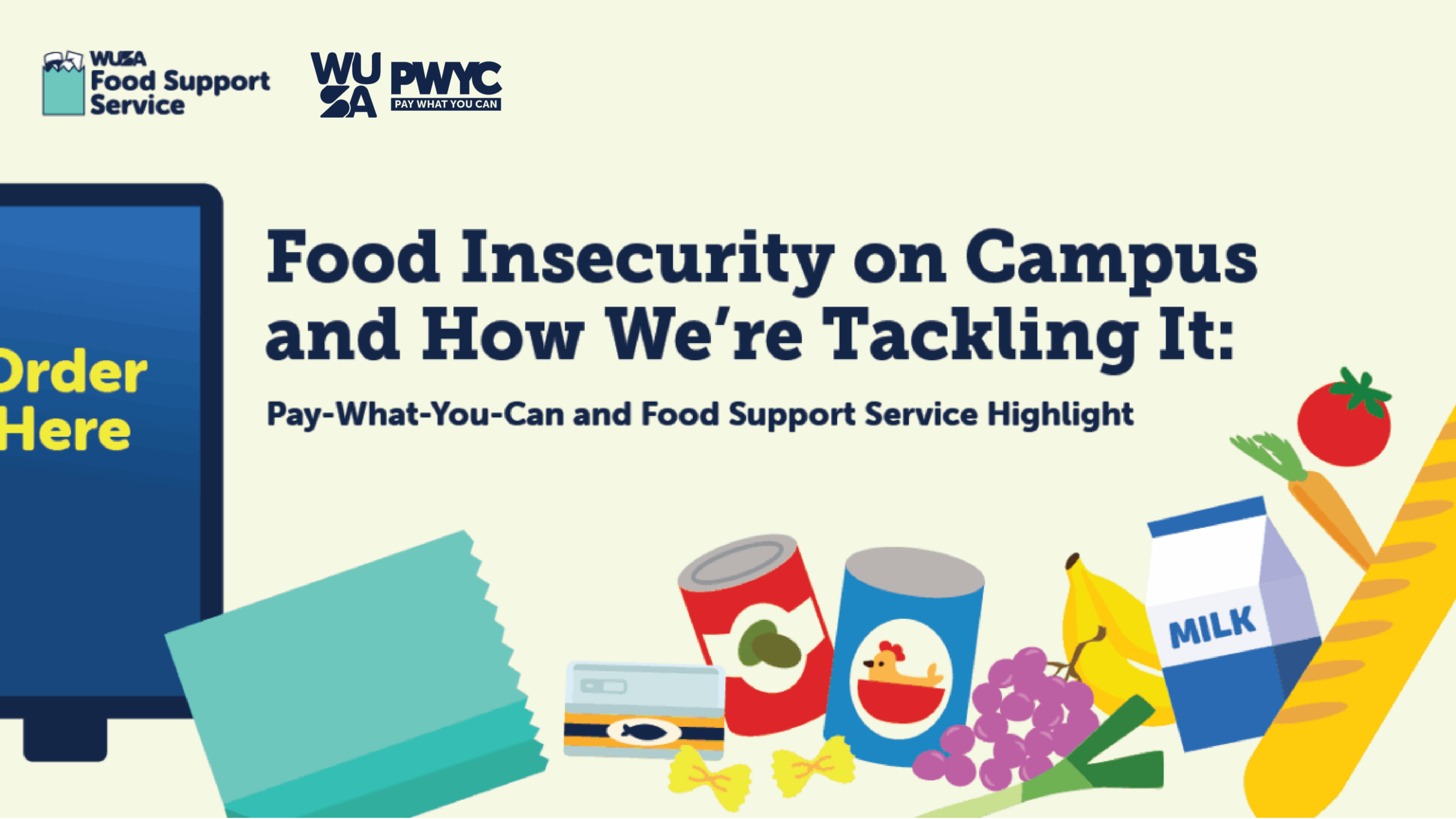Food Insecurity on Campus and How We’re Tackling It: Pay-What-You-Can and Food Support Service

While many might think of food insecurity as skipping meals or going hungry (which is certainly part of the definition), it also looks like not being able to access or afford healthy and nutritious meals. Think of the proverbial student who only eats ramen noodles. That is normalized food insecurity and poverty among students! During 2023, about 29% of students faced food insecurity, which is above the national average. Black and Indigenous communities and students are among the most affected.
Food insecurity isn’t just about rising grocery prices (though that is certainly part of it). It’s rooted in systemic poverty and in the affordability crisis. The cost of housing and tuition is rising, wages have stagnated, and unemployment is rising amongst young people. Students are getting squeezed from every direction. This all impacts the ability of students to afford food, which in turn has consequences for their academic, mental, and physical health. Students who are food insecure are more likely to not go to class, see their grades drop, and withdraw from school when compared to their food secure classmates. This is why WUSA has included affordability as one of its advocacy priorities in our 2025-26 Annual Plan.
While addressing food insecurity requires systemic change at multiple government levels, we are taking immediate action with two direct-support programs — the ongoing Food Support Service (FSS) and the new Pay-What-You-Can (PWYC) program.
Introducing Pay-What-You-Can Meals
Launching this October, this brand-new program run from SLC’s The Bomber has a simple philosophy — feed students nourishing meals, improve accessibility, and reduce stigma. In April 2024, WUSA’s Board of Directors approved a one-time allocation of $100,000 to support students facing food insecurity. The amount was designated to be used to feed students who need assistance through a program run out of The Bomber.
Here is how it works:
- Be a University of Waterloo Undergraduate Student
- Come to The Bomber on the SLC’s 1st floor starting at 11am Monday to Friday (excluding holidays).
- Use one of the available kiosks to pay for the full meal value, a partial amount, or $0.01 —depending on what you feel you can afford. This approach helps reduce stigma, as only you know how much you paid.
- Pick up your meal from the counter!
These meals are made in our kitchen every day with halal meat and with limited vegetarian and vegan options. Meals are available while supplies last.
Food Support Service: Confidential, 24/7, and for Anyone
The Food Support Service is confidential and dedicated to providing hygiene and food hampers to all members of the University of Waterloo community. As long as you have a WATCard you can go to the Turnkey desk and request the hamper of your choice. We have meat, halal, kosher, veggie, and general hygiene hampers ready to go. However, if you have other dietary restrictions or allergies, you can fill out a Hamper Request Form and we’ll do our best to accommodate! The Turnkey Desk is open 24/7, so a hamper can be picked up at any time.
Demand for FSS is growing, reflecting the broader rise of food insecurity across Canada. FSS gave out 158 hampers during the spring 2024 term. During the spring 2025 term, FSS gave out 200 hampers. That’s nearly a 26% increase in just one year!
Where to Go for Help and How to Give Back
To learn more about the Food Support Service, visit their page on the WUSA website, follow their Instagram page @wusafoodsupport, or email them your question at foodsupport@wusa.ca.
Food and hygiene hampers are available 24/7 at the Turnkey Desk in the SLC with a WATCard.
You can support FSS by donating non-perishable food items at various drop off locations, providing a monetary donation, or by volunteering.
Find out more information on the new Pay-What-You-Can program here and follow the WUSA Instagram page @yourwusa and @savewithwusa for progress updates. Find PWYC at The Bomber when available.
You Deserve Nourishment
Food insecurity can make someone feel embarrassed, stressed or like they’ve failed. Being food insecure is never a personal failure. Access to food and nutrition is a human right. If you’re struggling to balance the cost of healthy meals with other expenses, these programs are here for you. Take full advantage. Everyone deserves food that nourishes their body and mind!
Silvia Randazzo Carrie
Communications Assistant
Published: Friday, October 17, 2025
